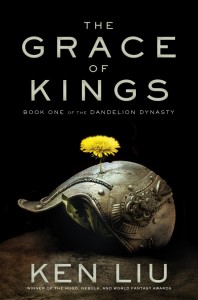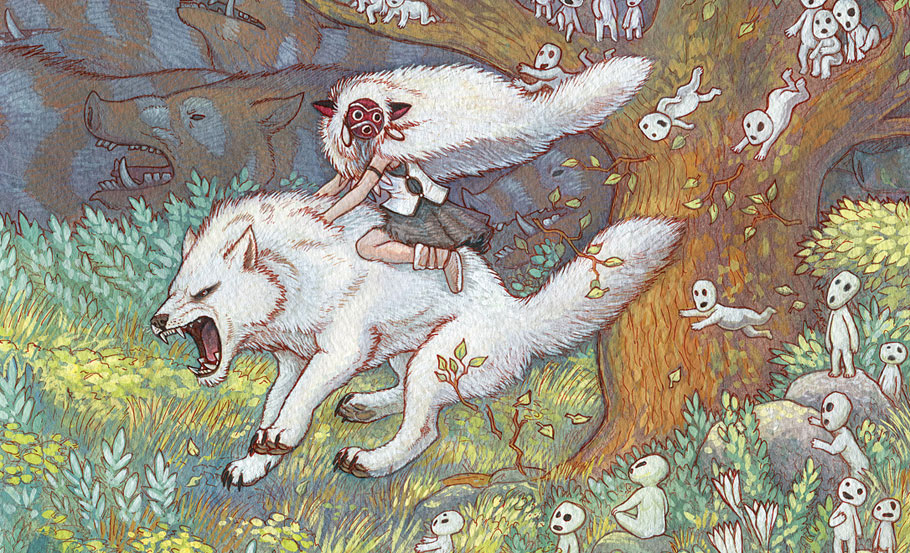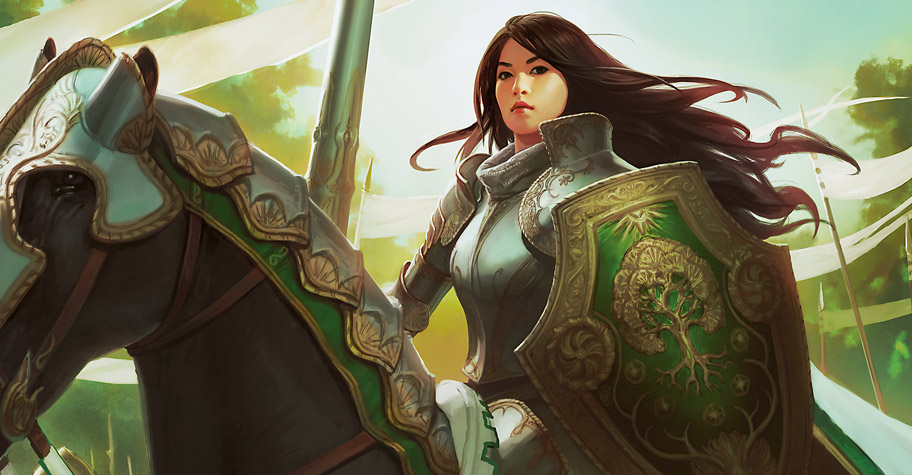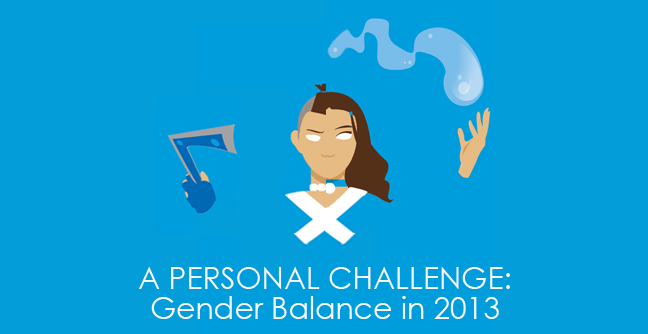The Grace of Kings by Ken Liu
Publisher: Saga Press -
Pages: 640 -
Buy: Book/eBook
[Editor’s Note: What follows is a critical essay in the traditional sense: an in-depth and spoiler-filled analysis of Ken Liu’s The Grace of Kings—focused particularly on the women in the novel. It’s thoughtful, beautiful, and important—but if you’re sensitive to spoilers, you might enjoy reading it more after you’ve completed Liu’s epic novel. If you’re looking for an (almost) spoiler-free review to help you determine whether to buy it, let me suggest Justin Landon’s review on Tor.com.]
Many months ago Joe Monti, editor of Saga Press, Simon & Schuster’s SFF imprint, sent me a copy out of the blue of Ken Liu’s The Grace of Kings for a possible quote. More precisely, and using the proper polite etiquette, he contacted my editor at Orbit who forwarded his email to me.
I knew Ken’s name, of course. He’s a multiple award winner (Hugo, Nebula, World Fantasy) for his short fiction. He has also done an important service to the sff field by translating short fiction and novels from Chinese into English, works that readers in the English-speaking market would not otherwise be able to enjoy. The Grace of Kings is Liu’s debut novel. Read More »
“I pretend I am a princess, so that I can try and behave like one.”
-Sara Crewe in A Little Princess
I had loved reading fantasy as a child, but even as an older teen I struggled to find speculative fiction that challenged me without making me feel unwelcome and unvalued.
In the early oughts, I nearly gave up on epic fantasy altogether. Until I stumbled across a copy of The Dragonbone Chair at a used bookstore. I can’t quite remember why I decided to give it a chance, but I’m incredibly glad that I did. My love for Tad William’s Memory, Sorrow, and Thorn isn’t unconditional, but it did a lot to restore my faith that I could find fantasy stories that I would enjoy as an adult. I had loved reading fantasy as a child, but even as an older teen I struggled to find speculative fiction that challenged me without making me feel unwelcome and unvalued. After all, Terry Brooks may have given me Brin Ohmsford, but he also turned Amberle into a tree. It wasn’t just that the lives of the girls and women in these novels seemed to revolve around men. What bothered me more was that they rarely acted in ways that seemed logical, consistent, or grounded in anything resembling human behavior. My problem was not that Amberle sacrificed herself, but that I was never convinced it was in character for her to do so, especially as described in the book. And we won’t speak of Piers Anthony, and what it was like to read his novels, which came highly recommended, while also trying to deal with grown men yelling things about my body at me while I walked home from the library. Read More »
I’m going to tell you a story about llamas. It will be like every other story you’ve ever heard about llamas: how they are covered in fine scales; how they eat their young if not raised properly; and how, at the end of their lives, they hurl themselves – lemming-like- over cliffs to drown in the surging sea. They are, at heart, sea creatures, birthed from the sea, married to it like the fishing people who make their livelihood there.
Every story you hear about llamas is the same. You see it in books: the poor doomed baby llama getting chomped up by its intemperate parent. On television: the massive tide of scaly llamas falling in a great, majestic herd into the sea below. In the movies: bad-ass llamas smoking cigars and painting their scales in jungle camouflage.
Because you’ve seen this story so many times, because you already know the nature and history of llamas, it sometimes shocks you, of course, to see a llama outside of these media spaces. The llamas you see don’t have scales. So you doubt what you see, and you joke with your friends about “those scaly llamas” and they laugh and say, “Yes, llamas sure are scaly!” and you forget your actual experience. Read More »
Last year was the first time that I took part in Goodread’s Reading Challenge, which allows you to set a goal of how many novels you wish to read in the year. I read 25 books. It’s not a lot, but it’s what I can fit into an increasingly busy life. What I found more interested, however, was looking back at the list and reflecting on my reading habits throughout the year.
This year, I set myself a new goal 26 books, one more than last year and, more importantly, an even number. My secondary goal is to end the year not only at this number, but with 13 novels by female authors, and 13 novels by male authors, an equal split of gender. Why? Because last year I only read 8 novels by women, about 33% of my total output. Also, because I think it’s good to challenge oneself. Read More »

An author from an online writing group once offered some advice. He said a homosexual character should never be included in a story unless his/her sexual preference figured into the plot. Otherwise, it was a distraction, he said. To him, a gay character stood out—didn’t fit—and anything non-default about a character should be important to the plot.
Sometimes I get a dizzy feeling and I think I’m communicating with someone from another planet. This was one of those times. The idea that all characters must fit to some ‘default’ expectation threw me. How would I know who all my readers were, and what the ‘default’ was for them? Were they all straight? White? Middle-class? I didn’t think so. And where does one have to live so that homosexuals stand out as unusual? Yes, I have lived in urban areas most of my life, but still. Still. Even for an extremely plot-oriented writer (for whom characters are tools of the story), this guy was missing something.
So. Reader expectations. I cannot possibly guess what they are. I can comment only on reader behaviour, and that may reveal a bit about their expectations. And the first thing that comes to mind is that, as a member of both the fantasy/sci-fi community and the adjacent gaming community, I see a lot of discomfort with gender issues.
Read More »





